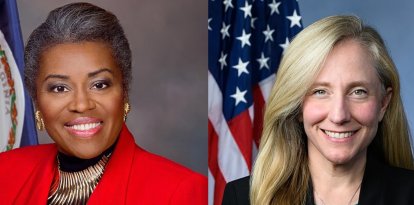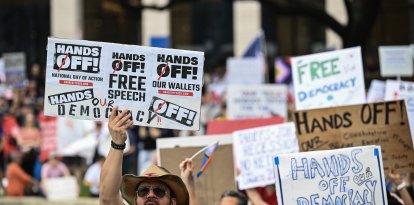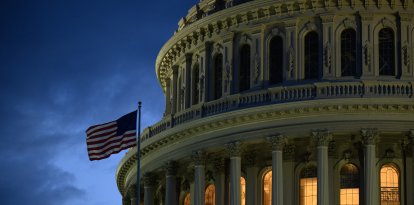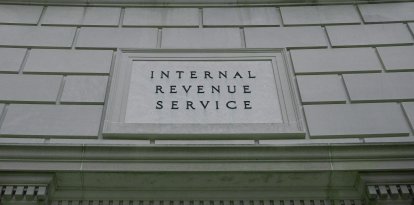Understanding the SAVE Act: The Republican plan to restrict federal voting to US citizens
The legislation, championed by Chip Roy (R-TX) in the House and Mike Lee (R-UT) in the Senate, is also backed by President Donald Trump.

Lee and Roy introduced the bill in their respective chambers
Congress is nearing consideration for the Safeguard American Voter Eligibility (SAVE) Act, a Republican-backed initiative that would require individuals registering to vote in federal elections to provide proof of citizenship. While Republicans argue that the legislation is aimed at preventing voter fraud, Democrats contend that it amounts to voter suppression.
The bill, championed by Chip Roy (R-TX) in the House and Mike Lee (R-UT) in the Senate, also has the backing of Donald Trump. The then-presidential candidate advocated for its inclusion in recent legislation aimed at preventing a government shutdown, but it was ultimately excluded.
The SAVE Act will return to Congress after passing the lower House in mid-2024. At that time, it received the support of all Republicans present, along with five Democrats: Henry Cuellar (D-TX), Jared Golden (D-ME), Vicente Gonzalez (D-TX), Marie Gluesenkamp Perez (D-WA) and Donald Davis (D).
After failing to gain traction in the Senate, Roy pushed the legislation again in the 119th Congress, hoping to pass it with Republican majorities in both chambers.
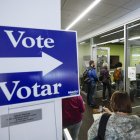

Politics
Rep. Byron Donalds announces his candidacy for governor of Florida
Emmanuel Alejandro Rondón
From the Supreme Court to the SAVE Act
The legislation’s background traces back to a 2013 Supreme Court case, Arizona v. Inter Tribal Council of Arizona, Inc. In that case, the Court struck down an Arizona law that, among other provisions, required voters to provide proof of citizenship when registering to vote and mandated that state officials reject any applications that did not include valid proof of citizenship.
The decision was 7-2, with Justices Antonin Scalia, Anthony Kennedy, John Roberts, Elena Kagan, Stephen Breyer, Ruth Bader Ginsburg, and Sonia Sotomayor in the majority, while Justices Clarence Thomas and Samuel Alito issued the dissenting opinion.
The court specifically noted that the Arizona law conflicted with the National Voter Registration Act of 1993 (NVRA) because it instructed state officials to reject even the National Mail-In Voter Registration Form, which is safeguarded by that legislation.
In short, the justices cautioned that the NVRA, as written, took precedence over a state's ability to require proof of citizenship in federal elections.
The invalidated Arizona law originated from Proposition 200, which was passed by voters in 2004 with 56% support. The proposition faced bipartisan opposition, including from John McCain (R), Jon Kyl (R) and Governor Janet Napolitano (D).
However, exit polls revealed that 47% of Latino voters supported the initiative.
What will the SAVE Act do?
In this context, the legislation seeks to amend the NVRA to allow states to require proof of citizenship when registering voters for federal elections.
Specifically, it will do the following:
- Amend the NVRA to require states to obtain documentary proof of U.S. citizenship when registering an individual to vote in a federal election.
- Establish a set of acceptable methods for proving citizenship and require states to create an alternative process for individuals who lack documentary proof of citizenship but are, in fact, citizens.
- Require states to establish a process for removing non-citizens from existing voter rolls.
- Impose federal penalties for knowingly registering a non-citizen to vote in a federal election.
What documents would the SAVE Act accept for voter registration in federal elections?
According to the text of the legislation, individuals must provide documentation consistent with the REAL ID Act of 2005, such as a passport or other proof of U.S. citizenship.
If the identification presented does not specify citizenship or place of birth, additional documentation, such as a birth certificate, naturalization certificate, adoption decree, or other forms listed in the legislation, must be provided to verify the individual’s legal status or place of birth.
">Pass the SAVE Act
— Mike Lee (@BasedMikeLee) February 23, 2025
Only U.S. citizens should vote in U.S. elections https://t.co/HjZGNkdTJ7
For and against
According to Congressman Roy's website, the legislation seeks to exclude illegal immigrants from federal elections, thereby strengthening the electoral system.
"American elections belong to American citizens, and the public's confidence in those elections is the cornerstone of our republic," the Texas Republican said.
"A vast majority of our countrymen agree: only American citizens should be able to register and vote in American elections. The SAVE Act gives states the ability to prevent illegal voter registration and protect the ballot box from foreign election interference," said Sen. Mike Lee, who introduced the legislation in the Senate.
The legislation has gained support from organizations such as the Only Citizens Vote Coalition, the Immigration Accountability Project, and the Article III Project.
">Hakeem Jeffries calls the SAVE Act a voter suppression bill. pic.twitter.com/YV5Vc630qV
— Freyja™ (@FreyjaTarte) July 10, 2024
While Republicans argue that the legislation would help prevent "voter fraud," Democrats contend that it would create "unnecessary barriers" in the registration process, excluding many voters who are currently eligible.
During the previous debate to avoid a government shutdown, Hakeem Jeffries called the SAVE Act "a voter suppression bill," further arguing that the legislation is redundant.
"Current law is very clear: What is so complicated about the fact that only citizens, under the United States Constitution and federal law, are permitted to vote in federal elections?" he added.
The Campaign Legal Center (CLC), a left-leaning nongovernmental organization, warned that the SAVE Act "would severely threaten mail registration and require online registration systems to be overhauled to meet the bill’s requirements." In fact, the legislation specifies that individuals will be required to submit paperwork in person.
Regarding the proposed changes to accepted documents, the CLC warned that "people of color, married individuals who have changed their names, as well as the young and the elderly, are more likely to have difficulty accessing these documents."
"The vast majority of states do not actually verify the citizenship of individuals registering to vote"
VOZ spoke exclusively with Hans von Spakovsky, a senior jurist at the Edwin Meese III Center for Legal and Judicial Studies at The Heritage Foundation and director of the Electoral Reform Initiative at the same think tank. Von Spakovsky also played a role in drafting the SAVE Act alongside Congressman Roy.
Regarding the current state of the U.S. electoral system, he acknowledged some progress since the 2020 elections but emphasized that there is still much work to be done. "It still has a lot of problems. One of the worst is that, in essence, we’ve had an honor system for registering to vote, and the vast majority of states do not actually verify the citizenship of individuals registering to vote," he said.
He argued that the SAVE Act is necessary, asserting that it would help prevent individuals who should not be voting from doing so. To illustrate his point, he explained that certain states, like Texas, Virginia, and Alabama, began comparing their state voter registration lists with their driver’s license records.
"When individuals go in to get a driver's license, you do have to provide proof of your identification and also your residence. And they require you to show whether or not you are a U.S. citizen. And that's noted in your records. You can still get a driver's license even if you are not a U.S. citizen and you are legally in the U.S. in places," he explained.
"But when they compared those lists, Texas found 6,500 individuals who, when they got their driver's licenses, presented documentation that they were not U.S. citizens, yet they were registered to vote. Virginia found 6,300 individuals just before the election. Alabama found over 3,000 individuals who were not U.S. citizens who were registered to vote. That shows you that there is a problem with this," von Spakovsky added.
Regarding Hakeem Jeffries' statements, the expert called it "an absurd claim."
"That is exactly the same nonsense that was said back 20 years ago when states finally started passing voter identification laws. (...)Georgia, for example, one of the first states in the country to put in a requirement that you show a photographic identification card, they've had record registration and record turnout in the state since they put that ID requirement in," von Spakovsky stated.
RECOMMENDATION

